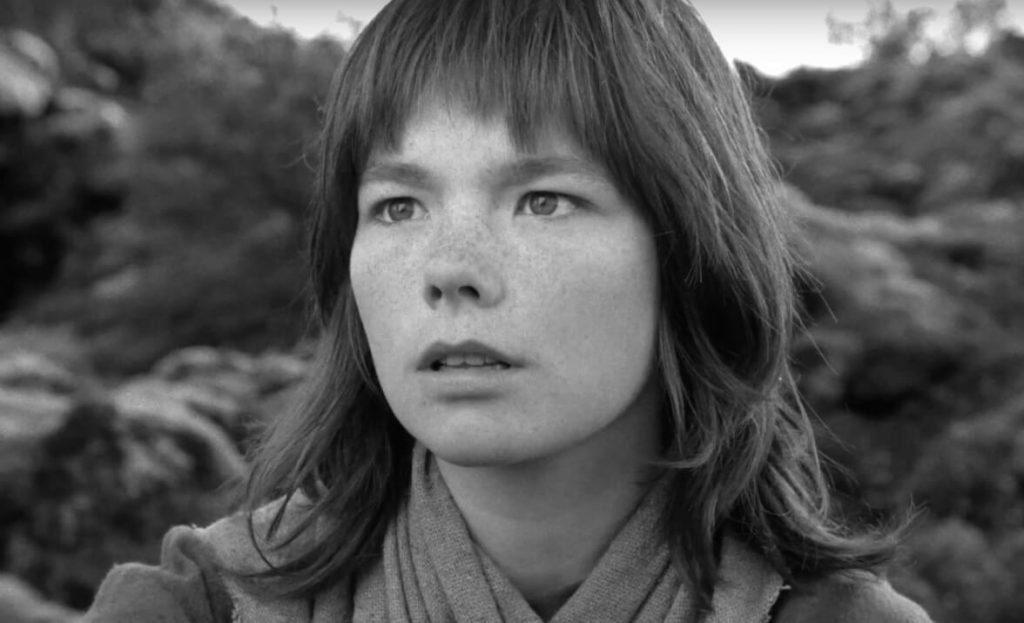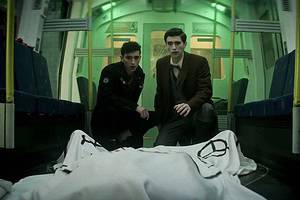Before she would come to be known as an art pop icon, or even a powerhouse actor in Dancer In The Dark, a young Björk debuted in the little-seen independent feature The Juniper Tree. While it was filmed in 1986, financial woes prevented the film from being released for four years until it finally debuted at the Sundance Film Festival in 1990. Since this time, it has largely been out of circulation until many different parties banded together to make sure this essential bit of independent cinema was preserved with a 4K restoration. Based on a fairy tale of the same name by the Brothers Grimm, The Juniper Tree serves as the debut film of late filmmaker Nietzchka Keene who we unfortunately lost to cancer in 2004. While a straight adaptation of the hyper-violent story would be interesting, Keene instead chose to tackle and reframe the story from a woman’s point of view as a commentary on the misogynistic conceit that women who dare to speak their minds are to be feared.
The fear of women is clear from the opening moments of the narrative where Margit (Björk Guðmundsdóttir) and her older sister Katla (Bryndis Petra Bragadóttir) are mourning the recent stoning and burning of their mother (Guðrún S. Gísladóttir) for witchcraft. These mystic young ladies are not in the market for revenge, only safety. The only option is for the two to go somewhere no one knows them where Katla can find a husband to bewitch and grant them a secure life. Keene uses the vast emptiness of their beautiful Icelandic shooting location to convey the unsparing environment that lies before them. It is not long before they meet a recently-widowed farmer named Johann (Valdimar Örn Flygenring), who’s been left to be a single father to his child-age son, Jonas (Geirlaug Sunna Þormar). Katla coaxes her way into his heart, but the newly blended family does not come together seamlessly thanks to the young Jonas being suspicious of some of Katla’s maternal instincts.

While Jonas accurately believes Katla to be a witch, he does find a comforting bond with Margit over the grief of losing their mothers. Honestly, he should probably be more concerned about Margit, who is having frequent visions of her mother through her gift of second sight. Björk brings a natural aloofness to Margit as she spends a large portion of the film wandering around the rocky shores of her new home while singing and making shadow puppets. She stands in stark contrast to the other members of her family that are starting to feel threatened and paranoid. Jonas’ resentment only continues to bubble even as Katla genuinely tries to make a connection with him. The feelings of the son infect the father somewhat as Johann is torn between the love of his son and his feelings for his new wife, plus the guilt that comes from that. Katla, of course, feels backed into a corner as all her motherly tendencies are rebuffed and her character cast into question by this little brat. Only Margit can see the situation with clear eyes, but this comes with its own set of issues.
Keene chooses to lean heavily on visuals for her storytelling choices which makes what dialogue is in the film that much more impactful. This approach makes sense when you learn of her deep affection for the great Carl Th. Dreyer (The Passion of Joan of Arc). The visuals caught by Randy Sellars are oftentimes truly stunning, but admittedly the narrative can feel a bit thin even at less than 80 minutes. This film has a purposefully slow and deliberate pace which serves it well, but some audience members may find the narrative too sluggish. The film builds nicely to a conclusion which allows for some deeply impactful moments and evocative imagery that will stick with you long after the feature has concluded. While the story itself may not be hard to understand, the film is one that holds a lot of secrets within its imagery that make it one you will want to explore again and again. The fairy tale version of this story painted the women as child-eating villains, but Keene does something much more nuanced that has only allowed this film to feel more relevant as time has continued.

Video Quality
The Juniper Tree makes its US Blu-Ray debut in its original 1.66:1 thanks to Arbelos with a brand new 1080p release sourced from a 4K digital restoration of the original camera negative. For a film that uses imagery so effectively, it is heartening to see it look so spectacular. The gorgeous black-and-white photography shot by Randy Sellars sparkles in high definition with natural grain respectfully intact. There is a fantastic amount of detail present with nice textures on the clothing, especially in the shabby garments that adorn these characters. The new transfer shows off a great amount of depth and enhanced detail within the living quarters or the vast lands. Black levels are very deep with no trace of black crush, compression artifacts or other digital anomalies. The nuance in the grays is quite impressive throughout. The contrast is well defined, and there is virtually no print damage to be found. Arbelos has given this one the 5-star treatment.
Audio Quality
The Blu-Ray disc comes with a very strong LPCM 1.0 mono track with optional English subtitles. The transfixing score from Larry Lipkis anchors the film and sounds great when it pops up throughout, as it draws you into the inner lives of the characters. Keene makes films that are incredibly sparse, and this track does everything it needs to ensure that dialogue comes through clearly. Environmental sounds such as coastal waves or weather effects are rendered well alongside everything else. There does not seem to be any majorly noticeable instances of age-related wear and tear. Arbelos has given this film the perfectly preserved, faithful audio presentation it deserves.

Special Features
The Blu-Ray of The Juniper Tree includes a booklet featuring the short essay “The Juniper Tree” by writer Angeline Gragasin which discusses this film as a feminist statement and the rediscovery of its power. This piece is complemented by the personal essay “Personal Reminiscences of The Juniper Tree” by associate producer Patrick Moyroud in which he discusses his friendship with Keene and his memories of the production. Finally, there is a piece entitled “A Visionary Rediscovered” by archivist Amy Sloper in which she details the path to have this film preserved and restored. All of these pieces provide a great analysis of the film through a personal and historical perspective. The case also includes a reproduction photograph of Björk taken during the filming of The Juniper Tree. The on-disc special features are as follows:
- Still (1978): The first of three short films included from director Nietzchka Keene. This four-minute piece follows a woman in a bathtub as she makes her way to a mirror in a way that is not exploitative. This is a very serene, minimal piece.
- Hinterland (1981): A 25-minute short which offers the most story out of the three films. This piece involves a woman in the Hinterlands who is asked to take care of a young child and how that impacts her psyche.
- Aves (1998): A highly experimental seven-minute still-photography and animated short that involves a nun weaving. The mixture of the medium is quite compelling.
- New Interview with Randy Sellars: A 29-minute interview with cinematographer Randy Sellars that is incredibly insightful to the creative process. In this piece, Sellars discusses how he came on board to the project, cinematic reference points for the aesthetic of the film, the pros and cons of the sun patterns in Iceland, getting around not having walkie-talkies and more fascinating tidbits that are well worth a listen.
- Interview with Nietzchka Keene: A 15-minute archival interview with the late director in which she delves into the themes and events of the story, interpreting the Grimm’s fairy tale, her thoughts on witchcraft, developing designs appropriate to the period and many more stories that are quite excellent.
- Outtakes from The Juniper Tree: Four-and-a-half minutes of behind the scenes footage not intended to be humorous, but rather offer a glimpse into the production process. Some of these moments are provided with voiceover from Keene.
- U.S. Theatrical Trailer: The nearly two-minute trailer is provided for the film.
Final Thoughts
The Juniper Tree is a deeply rewarding debut feature film from a filmmaker who we lost too soon. Although this is an independent production in every sense of the word, the techniques on display are on par with some of the masters of the craft. Björk is just one of the several talented cast members who deliver impeccable work. The fact that a young girl played the role of Jonas is a fact that still blows my mind after learning it. This film will not be approachable for all audiences, but those who appreciate a well-made arthouse picture will love exploring this one. Arbelos has rescued this film from obscurity with a magnificent Blu-Ray sporting a stunning A/V presentation and a lovely array of special features. Recommended
The Juniper Tree is currently available to purchase on Blu-Ray.
Note: Images presented in this review are not reflective of the image quality of the Blu-Ray.
Disclaimer: Arbelos has supplied a copy of this disc free of charge for review purposes. All opinions in this review are the honest reactions of the author.

Dillon is most comfortable sitting around in a theatre all day watching both big budget and independent movies.







